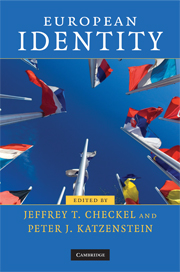Book contents
- Frontmatter
- Contents
- List of figures
- List of tables
- List of contributors
- Preface
- 1 The politicization of European identities
- Part I European identity as project
- 2 Political identity in a community of strangers
- 3 Experimental identities (after Maastricht)
- 4 The public sphere and the European Union's political identity
- Part II European identity as process
- Part III European identity in context
- Bibliography
- Index
4 - The public sphere and the European Union's political identity
Published online by Cambridge University Press: 05 June 2012
- Frontmatter
- Contents
- List of figures
- List of tables
- List of contributors
- Preface
- 1 The politicization of European identities
- Part I European identity as project
- 2 Political identity in a community of strangers
- 3 Experimental identities (after Maastricht)
- 4 The public sphere and the European Union's political identity
- Part II European identity as process
- Part III European identity in context
- Bibliography
- Index
Summary
Since the early 1990s, two factors have had a significant impact on the pace and character of European integration. The first factor is the end of the permissive consensus that had prevailed until then. The main symptoms of this change have been a steady decline, to historically low levels, in the level of popular EU support; and episodes such as the rejection of the European Constitution by a majority of French and Dutch voters. The second factor is division among European leaders concerning future institutional developments in a twenty-seven-member Union.
The two factors converged in the 2005 constitutional crisis, not because cleavages among the elites mimic those among the population, but rather because popular discontent helped to undo the fragile consensus that had been achieved by European Union elites around the constitutional project. At stake is disagreement between political elites and a significant segment of the population on the values that should sustain the European project (see Hooghe 2003) and also among the different national elites on the limits of supranationalism. In the context of the politicization of the European Union in the 1990s, triggered by the increasingly political character of the EU and signaled among other things by the repeated organization of referenda on new EU treaties, the permissive consensus prevailing until then has broken down (see Katzenstein and Checkel in this volume) and deep disagreement among elites has surfaced.
- Type
- Chapter
- Information
- European Identity , pp. 81 - 108Publisher: Cambridge University PressPrint publication year: 2009
- 25
- Cited by



